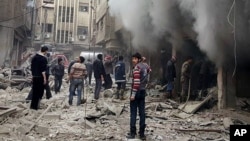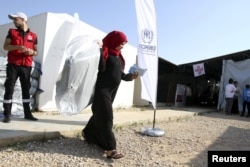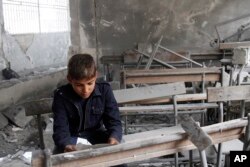A recent escalation in airstrikes along Syria’s border with Turkey has damaged health care facilities and schools, jeopardized routes vital to delivering food and medical supplies, and heightened an already severe humanitarian crisis, aid groups say.
"The number and severity of airstrikes" by the Syrian government and its allies have intensified in northwest Syria since November 24, "causing civilian casualties, major damage to civil infrastructure and triggering new displacements of population," the U.N.'s Office for the Coordination of Humanitarian Affairs reported this month.
The rising violence coincides with an increase in airstrikes by Russia, which began its bombing campaign in Syria on September 30. Moscow says it targets Islamic State extremists, but the United States and NATO say it primarily aims at dismantling moderate Syrian opposition to President Bashar al-Assad’s regime. After Turkey shot down a Russian warplane that had strayed into its airspace November 24, Russia stepped up its attacks against rebel groups.
An increase in airstrikes "threatens critical supply routes for humanitarian aid," Mercy Corps spokeswoman Christy Delafield told VOA on Tuesday.
The U.S.-based nonprofit organization operates one of Syria's largest food delivery systems, serving approximately 500,000 people a month. Delafield said that with the Syrian civil war now heading into its fifth year, the increase in bombings parallels a rise in desperation.
"Families are telling us we are their only source of food," she said.
Impact of violence
Hunger is only one gauge of Syria's misery. Violence has killed at least 250,000, injured more than 1 million and dislodged more than 10 million, according to OCHA. About 4.3 million have fled to neighboring countries, and at least 6.5 million are internally displaced.
"They’re living in ruins, they’re living in open spaces without proper coverage," said Stuart J. Sia, a spokesman for the group Save the Children. "With this new phase of attacks, many of those who've already fled their homes are being forced to leave again, and they have nowhere to run."
The U.S.-based aid group has "had to suspend some of our programs in northwest Syria because of the difficult security," he said, adding it has continued vaccination programs to combat polio and hepatitis.
The OCHA report said that because of bombings by the Assad regime and its allies, presumably Russia, “a number of international and local humanitarian organizations have suspended operations in northwest Syria.”
Businesses, utilities, hospitals
Late November airstrikes by Syrian government and Russian warplanes shut down multiple bakeries, a mill and a water pumping station in Idlib province, OCHA said. It noted that bombing raids since early October also have severely damaged more than 20 health facilities, resulting in "a number of casualties among health workers and patients."
Last week, the medical charity Doctors Without Borders said two of the hospitals it supports – in Zafarana in Homs province and in rural Damascus – have been bombed since mid-November.
It also said that recent aerial bombing of the main road from Kilis in Turkey to Aleppo, Syria, forced the group "to halt the distribution of relief items to about 40,000 people in eastern Aleppo."
Mercy Corps conducts much of its relief work from Turkey, organizing stocks of canned goods, rice, flour and other staples, then working "with local partners to see that [food] gets to individual families," Delafield said.
The organization is committed to serving vulnerable people, Delafield added, but "it's really a day-by-day assessment to determine whether the route is safe" for delivery.
Education gap
While hunger is growing, "we’re also seeing this tragic gap in education for young people," Delafield said.
The OCHA report said several schools had been damaged since early October. And last week, bombs struck a school near Aleppo in northern Syria, killing two female teachers and a toddler whose older sister is a student. It's one of 55 Syrian schools supported by Save the Children, Sia said, adding that the bombing "seems to be indiscriminate."
According to Save the Children's research, as many as 2.4 million Syrian children cannot attend school.
Mercy Corps' Delafield said, "We’re talking about 17-year-olds who haven’t been in school since they were 12. These young people represent the future of the country, the future of the region."
Only a political solution can stop the violence, she and others said.
Meanwhile, "despite the challenging and dangerous conditions, we and our partners continue, wherever and wherever possible, to deliver life-saving aid supplies and services for people in Syria," OCHA spokeswoman Amanda Pitt said in an email to VOA.






